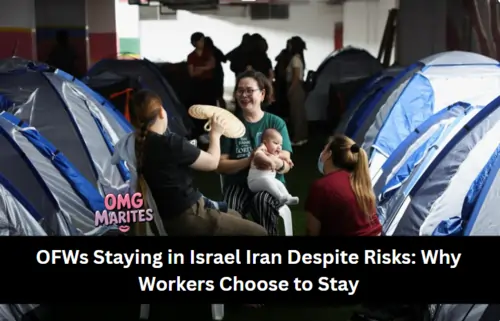MANILA, Philippines – June 2025
Despite the growing instability in the Middle East due to rising tensions between Israel and Iran, OFWs staying in Israel Iran despite risks are still choosing to remain in the region.
The Philippine government has raised Alert Level 3 in both countries, urging Filipino workers to consider voluntary repatriation, but so far, fewer than 0.02% of the over 2 million OFWs in the area have requested to return home.

Low Number of Repatriation Requests
As of this week, the Department of Migrant Workers (DMW) has recorded just 311 requests for repatriation.
The first group of OFWs arrived on June 24, with DMW Secretary Hans Leo Cacdac accompanying them. Despite a tentative ceasefire between Israel and Iran, uncertainty remains in the region, which has left many OFWs opting to stay.
Job Security Concerns: A Primary Factor
One of the biggest reasons many OFWs are staying in Israel and Iran is their concern about losing stable employment. Many workers are on fixed contracts and worry they won’t be able to return to the same jobs if they leave.
Patricia Yvonne Caunan, the head of the Overseas Workers Welfare Administration (OWWA), mentioned that workers often don’t want to leave their jobs, as returning home might mean losing their livelihood. Some workers, such as caregivers, may also not have a job to return to, especially if the person they were caring for has passed away.
Undocumented Workers and Challenges in Tracking
An additional complication is the presence of over 205,000 undocumented Filipino workers in the Middle East. “Third-country hiring” is a common practice where workers are initially registered in one country but end up working in another without notifying Philippine authorities.
This has made it difficult for the DMW and OWWA to monitor and locate all OFWs in the region.
However, Caunan emphasized that the government is still committed to helping all workers, including the undocumented, with repatriation and support. The DMW and OWWA are offering P150,000 in financial aid to all repatriated workers, regardless of their documentation status.
Conflicting Views on Risk Levels
There is a difference in how OFWs perceive the risk of staying in the Middle East. While some believe the situation is improving and that staying might be safer than leaving, others feel that repatriation is the safer option.
Caunan noted that more outreach from welfare officers is needed to help OFWs make informed decisions, especially as the situation in Israel and Iran continues to evolve.
Government Preparedness for Mandatory Evacuation
Although Alert Level 4, which would mandate evacuation, has not yet been declared, the DMW and OWWA are prepared for such a scenario. Should the situation worsen, both agencies have outlined plans for a mandatory evacuation.
Conclusion: Why Most OFWs Are Staying
While OFWs staying in Israel Iran despite risks face numerous challenges, including concerns about employment, safety, and the complex situation of undocumented workers, many are still choosing to stay.
The Philippine government continues to offer support through voluntary repatriation, financial aid, and outreach to ensure that OFWs are not left without help.
The decision to stay or leave ultimately depends on individual circumstances, but for now, many workers believe that the stability of their jobs outweighs the uncertainty of returning home.
References: 📚

Maria Theresa Mondragon, better known online as Antie Marites, is a 33-year-old Filipina content creator who’s turning “chismis” into credible news and meaningful conversation.
With a knack for storytelling and a passion for public service updates, Antie Marites creates relatable, informative, and bite-sized news content for the digital Pinoy. Whether it’s trending headlines, government announcements, or everyday life in the Philippines, she breaks it down in a way that’s clear, fun, and easy to understand—no filter, no fake news.
She’s the tita who sips her kape while scrolling DBM updates and turns it into your next viral TikTok.She’s also your go-to source for “real talk sa real-time news.”
Follow her journey and daily chika on:
📲 Facebook: OMGMarites
📱 TikTok: @omgmarites2025
